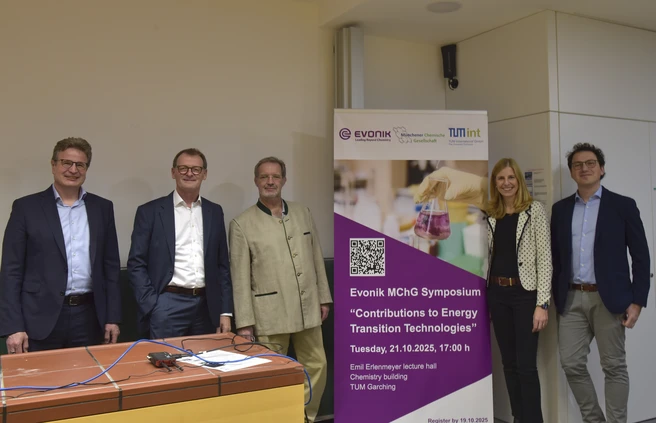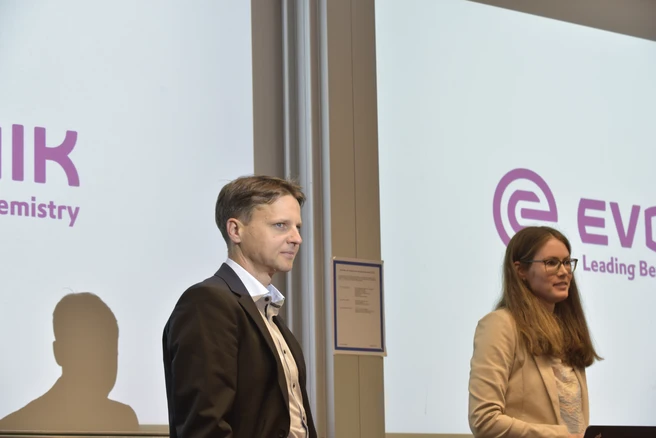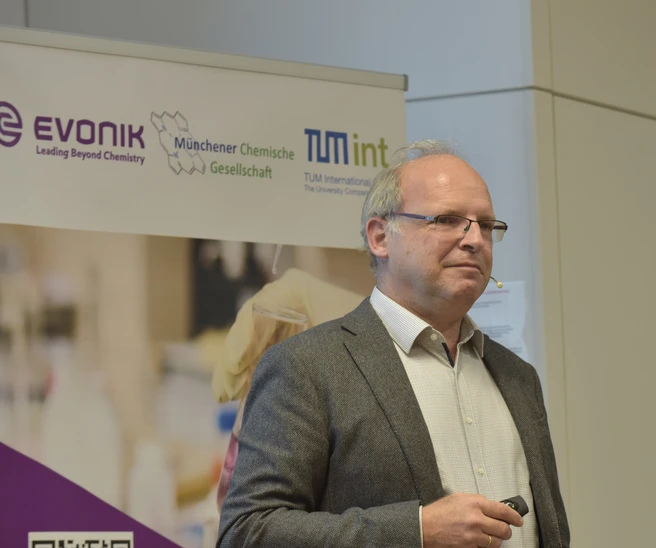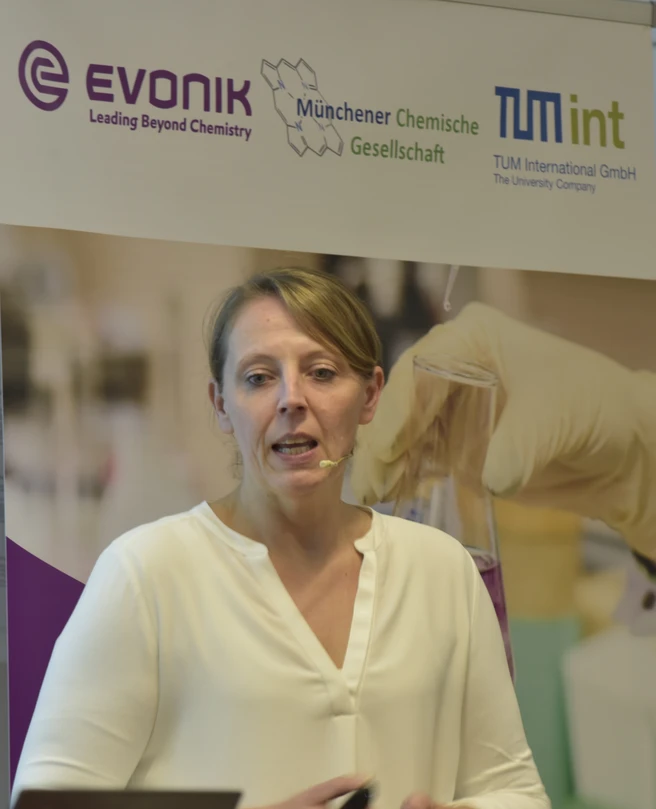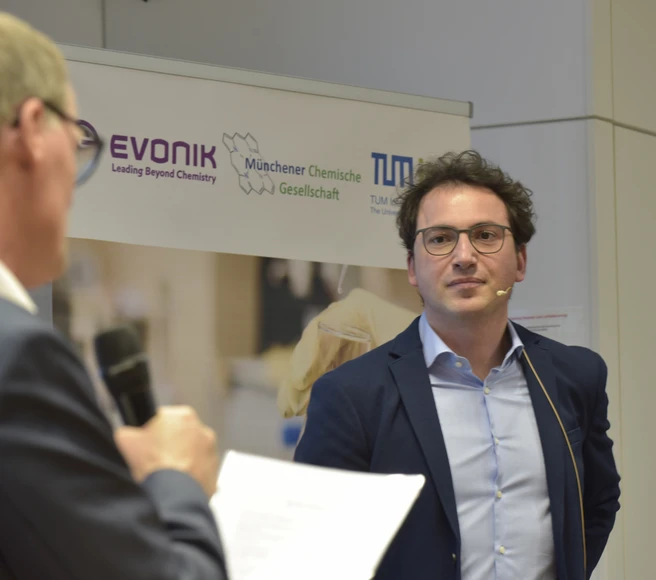On October 21, 2025, the Evonik Day 2025 took place at the TUM School of Natural Sciences – a symposium dedicated to the challenges and opportunities of modern energy transition technologies.
Organized in collaboration with Evonik Industries, the Munich Chemical Society (local section of the German Chemical Society, GDCh), and TUM International GmbH, the event filled the Science Cinema lecture hall at the Technical University of Munich (TUM), and it offered fascinating insights into current research and industrial applications focused on energy materials.
Prof. Richard Fischer (TUM) opened the event with a warm welcome to the many guests present both in the lecture hall and online. Together with Dr. Christoph Weckbecker (Evonik) and Prof. Tom Nilges, Head of the Department of Chemistry, he emphasized the importance of dialogue between industry and academia in fostering sustainable innovation.
Sustainable Processes through Electrodialysis
The scientific program began with a joint lecture by Prof. Michael Zavrel (TUM Campus Straubing) and Dr. Silvia Blank-Shim (Evonik Operations GmbH), titled “Towards more sustainable bioprocesses via electrochemical separation methods – opportunities and industrial example.”
Zavrel focused on the twelve principles of green chemistry and demonstrated how electrodialytic separation methods can help prevent waste and conserve resources. “Number one principle: prevent waste,” he emphasized.
Blank-Shim followed with industrial case studies showing that electrodialysis not only reduces greenhouse gas emissions but also advances progress toward a circular economy. Despite many challenges, she noted, the process had been successfully implemented in industrial operations.
Innovative Coatings for Metal Anodes and Long-Life Batteries
Next, Prof. Roland Fischer (TUM) presented his talk “Smart coatings for metal anodes: Drastic extension of battery lifetime.” Introduced with humor by his brother, Prof. Richard Fischer, he connected his renowned work on metal-organic frameworks (MOFs) to new developments in battery materials research.
He discussed aqueous zinc-ion batteries and the use of covalent organic frameworks (COFs) to stabilize metal anodes. A fluorinated COF film showed impressive results: over 100,000 charge cycles and significantly enhanced stability. “Polymers like COFs are wonderful – they’re inexpensive compared to MOFs,” remarked Prof. Roland Fischer.
Nanoscale Insights into Energy Materials
Prof. Johanna Eichhorn (TUM) followed with her lecture “Interfaces, Surfaces, and Defects in Photoelectrochemical Energy Materials.” She highlighted the role of nanoscale structures in improving the efficiency of energy conversion systems.
“For the transition to sustainable, green energy conversion, we need different technologies,” said Eichhorn. Using copper vanadium oxide thin films as an example, she showed how targeted nanoscale optimization can lead to macroscopic performance improvements. Her research builds a fundamental understanding of photoelectrochemical processes, paving the way for more efficient solar energy technologies.
Additives as a Key to Efficient Lithium Batteries
The final scientific presentation was given by Dr. Pier Francesco Caponi (Evonik Operations GmbH), titled “Small amount, big effect – where Evonik additives boost customer processes in lithium ion battery production.”
He demonstrated how Evonik additives enhance the mechanical properties and performance of lithium-ion batteries through optimized dispersion, wetting, and stabilization of electrode materials.
“Wetting quality depends strongly on the surface tension of the coating material and the desired application,” explained Caponi. Carefully tailored additive solutions enable higher cell performance and more cost-efficient production – highly relevant for the automotive industry.
In their closing remarks, Prof. Richard Fischer and Dr. Christoph Weckbecker thanked all speakers and participants. The evening concluded with a get-together over drinks and snacks, fostering lively discussions on the future of sustainable chemistry and energy technologies in an open, collegial atmosphere.
Heartfelt thanks to Evonik and Dr. Christoph Weckbecker for their enduring support and commitment to bridging industry and research at TUM.
Further Information and Links
- Evonik Industries
- Munich Chemical Society (Münchener Chemische Gesellschaft)
- TUM International GmbH
- Prof. Michael Zavrel, Professorship of Bioprocess Engineering
- Prof. Roland Fischer, Chair of Inorganic and Metal-Organic Chemistry
- Prof. Johanna Eichhorn, Professorship of Nanoscale Microscopy and Spectroscopy of Energy Materials
Press Contact
communications(at)nat.tum.de
Team Website
